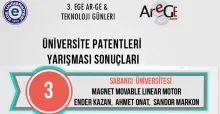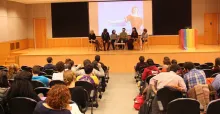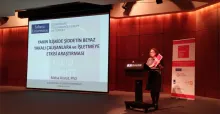Groundwork has been laid for the Composite Technologies Center of Excellence established by Kordsa Global in association with Sabancı University
Sabancı Holding Board of Directors and Sabancı University Founding Board of Trustees Chair Güler Sabancı: “This center introduces a new model to Turkey.”

A groundbreaking ceremony was held for the Composite Technologies Center of Excellence established by Kordsa Global in association with Sabancı University in Teknopark Istanbul with the attendance of Prime Minister Ahmet Davutoğlu. The Center will work on advanced, nanotechnology-integrated composite technologies that transform many industries from aviation to automotive.

Kordsa Global, a Sabancı Holding company, and Sabancı University established by the Sabancı Foundation held the groundbreaking ceremony for the Composite Technologies Center of Excellence, the product of an innovative industry-university partnership model, with the attendance of leading political, academic and industry representatives.

Attending the ceremony were Prime Minister Ahmet Davutoğlu, Deputy Prime Minister Yalçın Akdoğan, Minister of Science, Industry and Technology Fikri Işık, Minister of Development Cevdet Yılmaz, Governor of Istanbul Vasip Şahin, Sabancı Holding Board of Directors and Sabancı University Founding Board of Trustees Chair Güler Sabancı, Kordsa Global Board of Directors Chair Mehmet Pekarun, Sabancı University President Professor Nihat Berker, Sabancı University Board of Trustees Members Suzan Sabancı Dinçer and Sevil Sabancı, Kordsa Global CEO Cenk Alper as well as Sabancı Holding directors and the representatives of many companies and institutions that support the high technology initiative in Turkey. To be built in Teknopark Istanbul, the Composite Technologies Center of Excellence will work on composite material technologies.
Güler Sabancı: We are laying the stone for the future

Speaking at the ceremony, Sabancı Holding Board of Directors and Sabancı University Founding Board of Trustees Chair Güler Sabancı said that the center introduced a new model in industry-university partnership to Turkey, continuing, “For the first time in our country, we witness together the creation of a platform that will combine advanced materials, R&D, academic structure and production. Two Sabancı Group organizations, Kordsa Global and Sabancı University, start an initiative that is of paramount importance. Today, we are laying the stone for the future. We are beginning a new period. We set off on a new path with the objective to have Turkey make a difference in the global arena with advanced technologies, become a global player in this field, even joining the premier league. This is not an investment for tomorrow; this investment is for 10, 20, 30 years into the future. We believe in Turkey and its potential, and we invest in the future of this country.”
Sabancı went on: “This foundation is for a 65-million TL investment for now; however, the real value of this center stands far beyond this figure with the new frontiers it will set for our country as well as our Group through the value and model it will create. This center introduces a new model to Turkey. This is an exemplary model that has significant potential to contribute towards our 2023 objectives. The model brings different cultures (students, researchers, faculty members, entrepreneurs, engineers) together in the same ecosystem, allowing them to work in close cooperation, understanding their respective issues better, and creating better solutions more quickly by a common mind. They will share laboratories, work in the same environment, and run faster towards common goals – not in adjacent rooms but all together, at the same table, in the same lab. This will also allow the university to become a greater part of the economy. I hope that the success of this model will set an example to new centers to be built. One of our objectives for the year 2023 is to be one of the top 10 economies of the world. This requires an innovation-focused growth policy, and innovation-focused growth is only possible with the design and production of high-technology products.”
An investment of TL 65 million
The center will be built with an investment of TL 65 million and provide facilities for graduate education, fundamental research, applied research, product development, incubation services and commercialization opportunities in composite technologies, and will host PhD students and postdoctoral researchers, faculty members, incubation companies, researchers, engineers and employees for prototype production under one roof at the same time.
The center will have an indoor area of 10,000 square meters with 3000 square meters of laboratory facilities where Kordsa Global and Sabancı University will create a breakthrough ecosystem fueled by doing research, learning and producing together. The high-tech production facilities provided by Kordsa Global will enable the domestic manufacture of materials and composites subject to import controls.
The innovative model developed by Kordsa Global, the top-ranking company in the textile industry for two years in a row on the R&D Center Performance Assessment conducted by the Ministry of Science, Industry and Technology on all R&D centers in Turkey since 2013, and Sabancı University, a top contender of the Most Entrepreneurial and Innovative Universities Index since 2012, will bring together students, faculty, researchers, engineers, entrepreneurs and designers together in the same room towards common goals.
About KORDSA GLOBAL
Kordsa Global is a leading enterprise that serves the rubber, composite, and construction markets by providing reinforcing products. The company, with headquarters in Istanbul, Turkey, enhances its commercial leadership with its technological know-how, operating 10 businesses in 8 countries distributed over 5 continents, and employing approximately 4000. Kordsa Global's sales figure reached TL 1.5 billion in 2013.
Kordsa Global and the rubber sector
The success story of Kordsa, the world's leading nylon 6.6 and polyester industrial fiber, tire cord and its only cord producer, started in 1973 with a tire cord factory investment in İzmit, Turkey. The Company, in which Sabancı Holding, one of the leading conglomerates in the Turkish economy, has a 91.1% shareholding, exhibited continuous growth and with its global production capacities, continues to lead the sector, rapidly adapting its operations to changing market dynamics, while at the same time searching for new markets. Strengthening its R&D investments, the company has introduced innovative high-performance and green products to the sector and with the reinforcement solutions that it has developed, it has begun to catch the interest of the composite and construction sectors.
Yasal Uyarı
This document and its content are provided only for informational purposes and reflects information, products, materials and visuals current at the time of publication. The risk of a decision taken or a transaction effectuated based on any information in this document rests entirely with the person taking the decision. Kordsa Global and/or its subsidiaries make no warranties of any kind, express or implied, relating to the content, including to the truth, accuracy, timeliness, adequacy, merchantability, or fitness for a particular purpose thereof. The Company may not be held responsible for damages or losses of any kind arising out of the use of the information herein or of a decision taken or a transaction effectuated based on any information in this document.




























